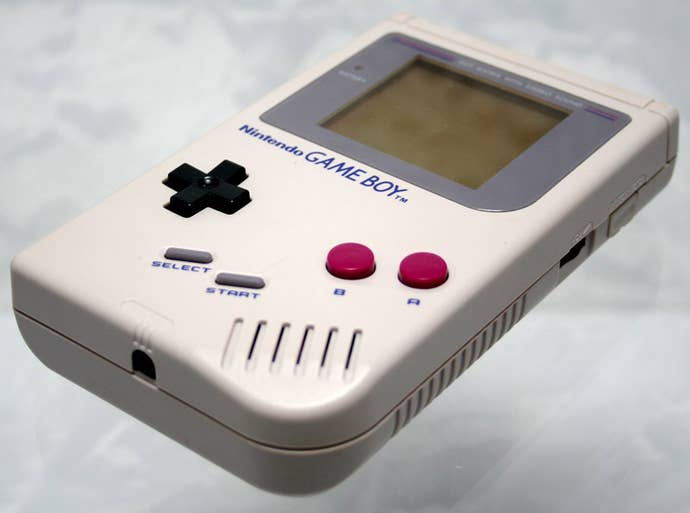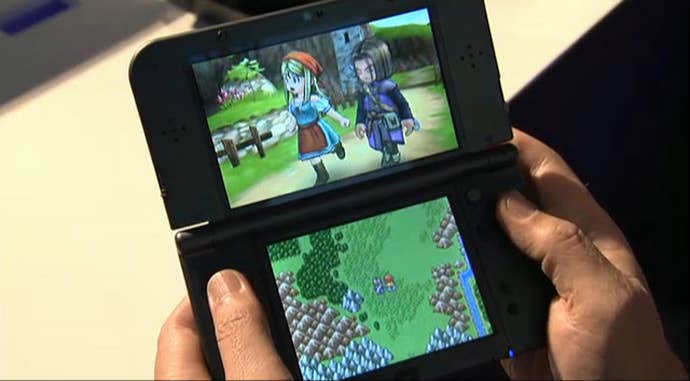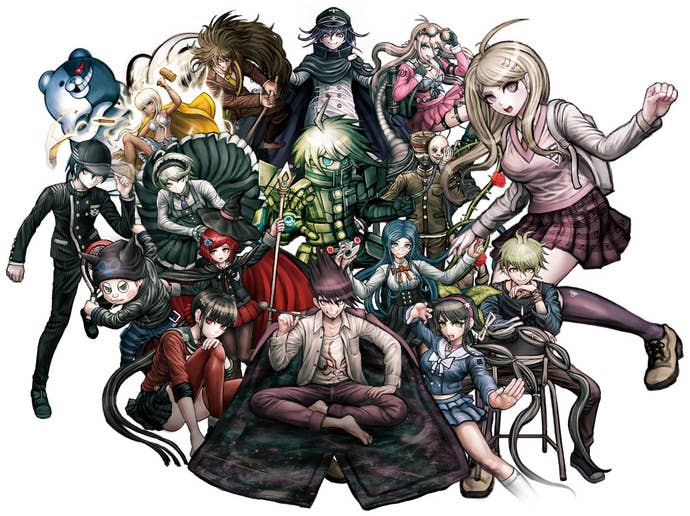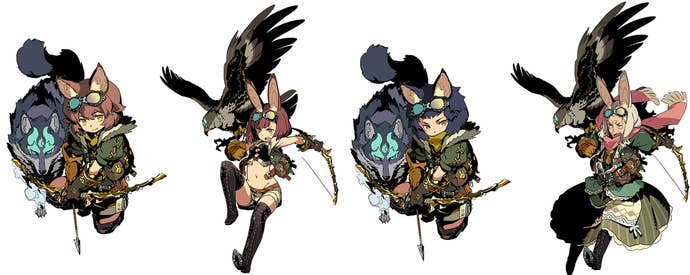The Handheld's Last Stand
2017 in Preview: The final days of 3DS and Vita herald the end of an entire way of gaming.
This article first appeared on USgamer, a partner publication of VG247. Some content, such as this article, has been migrated to VG247 for posterity after USgamer's closure - but it has not been edited or further vetted by the VG247 team.
Well, handheld systems, we've had a great run, you and I. God, will I miss you.
It's been nearly 20 years since I first ponied up for a portable console. It was a Game Boy Color, imported from an online retailer at the Japanese launch; for some ridiculous reason, I couldn't wait a few weeks for the American release. And since that fateful day, my handhelds and I have been inseparable: The rugged Game Boy Color; the magnificent Neo Geo Pocket Color; the esoteric WonderSwan. Game Boy and DS, in all their permutations, each distinctly capable, each burdened with a unique flaw. Sony's PSP. And now the Vita and 3DS, both struggling to live up to their respective predecessor's achievements.

The writing's on the wall, though. It has been for a few years: The 3DS struggled terribly for its first year of life, until Nintendo slashed the system's price and begged early adopters for forgiveness. And the Vita... ah, the poor Vita. Truly the most magnificent handheld ever created, abandoned practically at the moment of conception by a callous and uncaring creator. Mobile gaming on smart phone ate handheld gaming's lunch, and it looks like our current portable consoles — initiatives that had been put into motion before the rise of iPhone games — are finally coming to an end. And in their place is... nothing?
Well, I suppose that's not entirely true. Nintendo has its Switch on the way, and that offers a kind of portable experience. Precisely what kind remains to be seen; we'll know in a week or so. Still, I feel comfortable stating that it won't be in any danger of being mistaken for a 3DS-like experience — or even similar to that of the Vita. The things we do know about Switch simply preclude a faithful continuation of handheld gaming as we've known it.
For starters, it has only a single screen, which means it wouldn't be able to offer a proper backward-compatibility mode for DS and 3DS; the best Switch could muster up would be some sort of single-screen simulation as on Wii U Virtual Console. Even then, it wouldn't be able to duplicate the Wii U's Virtual Console double-screen mode, since the Switch's portable unit has to be docked (obscuring the screen, by design) in order to support play on a television. On top of that, the Switch core reportedly has to plug into its dock in order to charge its battery, which means you can't play while charging — despite plugged-in play having been a basic handheld gaming survival technique since the Lynx's debut in 1989. We also know nothing about the Switch core's wireless and multiplayer capabilities, whether or not it will carry over Street Pass, and all those other trivial little incidentals that make 3DS so enjoyable.
Make no mistake: The Switch will support gaming on the go. But its games, from what we've seen so far, don't appear to have been designed as portable experiences. It will play Skyrim on the go... but will this version of Skyrim have been comprehensively overhauled as a handheld game? Unlikely. It will support The Legend of Zelda: Breath of the Wild... which began life on the Wii U, will still appear on Wii U, and seems unlikely to have been completely redesigned from the ground up as a Switch game. Amazing handheld conversions on a technical front, but hardly bespoke portable experiences.
The reality is, handheld gaming isn't the same as console gaming. Even as the boundaries between the two have blurred in terms of hardware power and connectivity, they remain distinct evolutionary lines within the medium. Portable games fall somewhere between the quick, rapid bites of mobile games and the tuck-in-and-poopsock-it sustained experiences you expect on consoles and PCs. A portable game can be quick and breezy, or it can be deep and substantial. The best portable creations, however, balance these two approaches and provide play sessions that won't be undermined or spoiled by the need to suddenly set aside your system and deal with matters in meatspace. Think Pokémon: While every Pokémon game will take you dozens of hours to complete and hundreds to truly master, they always keep things simple and straightforward enough that you can snap your system's lid closed in an instant, then jump in again hours or even days later and not have to worry about feeling lost. It's a tricky balance to maintain, and the move away from dedicated, self-contained devices means these games experiences stand to become endangered.

And what about Sony? The company has barely even acknowledged the existence of the Vita for several years, and they've certainly never emitted even the slightest peep of having a replacement in the works. It really seems as though Sony has abandoned the entire concept of handheld gaming; they're happy to continue collecting residuals on Vita software, but clearly would prefer to focus strictly on consoles and VR, which is in every way the diametric opposite of portable gaming.
The question then becomes: What do handheld gaming fans have to look forward to for the remainder of these system's lives? (Which, frankly, isn't long.) Will handheld gaming have a place in 2017?
The answer may not be an unqualified "Yes, absolutely!" — but on the other hand, neither is the year utterly bereft of hope. Nintendo has indicated that the Switch is being treated as a replacement for the Wii U, not the 3DS. The new console's dual nature as both TV-based system and ersatz handheld means it will likely replace both in due time; plus, Nintendo's growing push into mobile games would make a new handheld system doubly redundant. For now, though, we can expect some support for the 3DS throughout 2017.
In the short term, the massive Dragon Quest VIII will arrive later this month, with an expanded port of Yoshi's Woolly World arriving in February, followed by the don't-call-it-Harvest-Moon farming sim Story of Seasons hitting at the end of the month. Further out, we can expect to see a new Box Boy puzzle platformer, more Picross, and hopefully Atlus's dungeon crawler Etrian Odyssey V. There's also Mario Sports Superstars for the jock in your life, and the intriguing action RPG Ever Oasis courtesy of Grezzo.

Meanwhile, although you never really hear about it, the Vita has an even stronger lineup in store for 2017 than 3DS. Its biggest release will most likely be Danganronpa V3, the next entry in the adventure/puzzler/murder mystery series by Spike Chunsoft. V3 will appear simultaneously on Vita and PlayStation 4, a cross-platform approach that will be seen in most of the rest of the system's big titles, including Akiba's Beat, Shakedown: Hawaii, and Ys Origin. For the jealous Vita fan, however, NIS America has several platform exclusives in the works, including doujin roguelike Touhou Genso Wanderer, God Wars, and the high-concept The Longest Five Minutes. Additionally, SEGA will be bringing over Valkyria Revolution, the long-awaited latest entry in the Valkyria Chronicles franchise, and there should be no end to the indie titles that show up throughout the year on Vita as well.
You may have noticed a single common thread linking all of these games, across both platforms: They're all decidedly niche in nature. Outside of the Yoshi port and Mario sports sequel, handhelds have become a haven for under-the-radar games. These games can easily sell 100,000 copies or more, but that's small potatoes in today's eight-digit-sales-hit-driven industry. Even if, say, Etrian Odyssey V makes it to the U.S. and sells as well as its predecessors have, nothing will change the fact that it's a first-person dungeon-crawler role-playing game with a heavy emphasis on party creation, uses manual map-drawing as its primary hook, and features an unrepentantly anime vibe. Big publishers have long since ceased to treat handheld platforms as being worth serious consideration for their major franchises, which has only accelerated the format's demise.
Which isn't to say that there's nothing to look forward to playing on the go in the coming year. Vita in particular continues to play host to a deceptively large number of appealing games from publishers who recognize the unique nature of the system's user base; where 3DS fans tend to have a casual connection to the platform and often disregard anything besides a first-party release, Vita fans are Vita fans, passionate and loyal. Unfortunately, owning the hearts of a modest little fanbase doesn't represent a viable business model for a company the size of Sony, which portends doom for its handheld aspirations once Vita fades into retirement. Nintendo might fare better with Switch — they'd certainly better hope they do — but it's hard to imagine much of a future for the DS family regardless of how well Switch performs. If it does well, it moots dedicated handhelds; if it flops, will Nintendo even want to remain in the hardware business?

So hold your handhelds close to your heart. Cherish those last few Street Passes, and savor your Remote Play. By all appearances, 2017 looks to be the final hurrah for an entire way of gaming. Sure, we'll have Switch's core unit and mobile games, but they simply aren't the same. Still, the spirit of Game Boy had a good, solid run of more than a quarter of a century. Would that most video game trends could make that claim.






